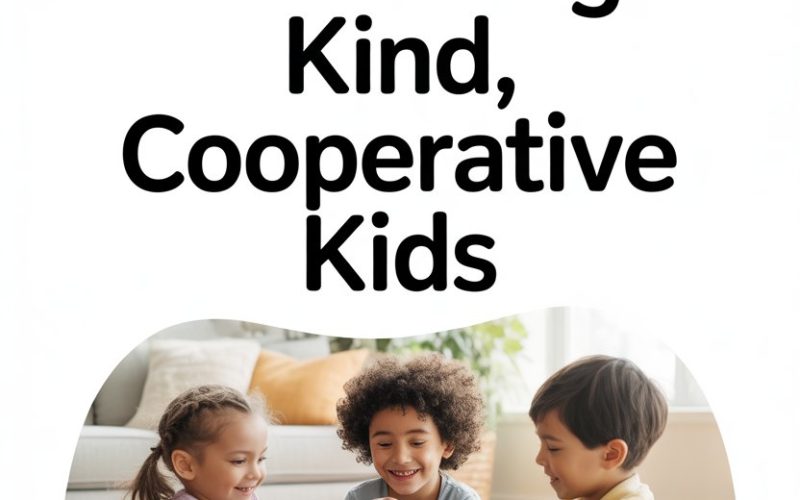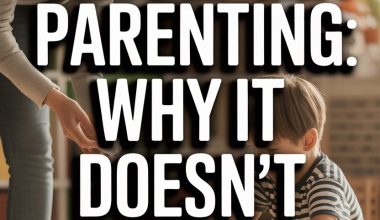If only there were a magic spell to transform our little ones into permanently sweet, considerate angels. (Sadly, “Please clean your room” chanted three times under a full moon has yet to yield results.)
Still, there’s more hope than most coffee-fueled parents realise. Kindness and cooperation aren’t mystical traits—they’re learned habits, grown bit by bit in the messy, everyday moments of family life.
Busy schedules, unending laundry piles, and the odd paint handprint on the wall don’t disqualify you from being the parent who raises kids others describe as “just lovely.”
Here’s the not-so-secret recipe—no cauldron required.
Model the Behaviour You Want to See
No, you don’t have to donate a kidney in the school car park to demonstrate empathy.
The smallest gestures—thanking your partner for the cuppa, apologising when you barked before caffeine, holding the shop door for a stranger—sink in far more than you’d think.
Researchers at the University of Chicago found children are extraordinarily adept at picking up subtle cues from adults.
Your “please”s, “thank you”s, and “oh, sorry, my mistake”s are like invisible seeds. Kids watch, absorb, and sooner than you’d expect, start echoing those behaviours back.
Tempted to mutter under your breath at another driver? Try narrating patience instead: “That driver must be having a tough morning.” It’s the little scripts you repeat that become their internal voices.
Say It, Show It, Repeat It
It’s easy to assume children just “know” what kindness looks like, especially when we’re already up to our elbows in toddler diplomacy.
The truth? Kids need kindness and cooperation broken down like any other skill—think shoe-tying, but with more emotional knots.
Spell out your expectations: “In this family, we speak kindly to each other.” Point out kindness when you spot it: “Did you see how you helped your brother find his sock? That’s very thoughtful.”
If they share a toy, notice it out loud. If they forget, gently remind: “Can you try asking in a calm voice?”
Consistency is magic. Not the fairy godmother sort, but the kind that grows trust. Your repeated cues shape their habits, and those habits add up.
Praise Effort, Not Personality
Labels can be sticky. Telling a child “You’re so good” might sound positive, but it doesn’t leave them much to aim for—or do differently—next time.
Instead, zero in on the action: “You were so patient while we waited in line” or “You worked hard to help clean up your crayons.”
This technique, supported by research from Stanford psychologist Carol Dweck on growth mindset, has a powerful ripple effect. Kids realise kindness isn’t something you’re just born with.
It’s something you practice, improve, and choose—even when you’re feeling a bit grumpy or hangry.
Who knew praise could actually be practical?
Teach Empathy Through Everyday Moments
Empathy sounds grand, but it often springs from the most ordinary stuff. Your child’s mate falls over at the park and starts to cry.
Instead of just brushing it off with a “You’re fine!” try: “She looks hurt. How do you think she feels? What could we do to help?”
Books are a secret weapon here. Stories, especially those featuring characters from different backgrounds or facing challenges, invite children to step into someone else’s shoes (without the blisters).
There’s a reason teachers and child psychologists rave about books like Last Stop on Market Street and Have You Filled a Bucket Today? Read-Aloud Books to Teach Kindness
Don’t worry about being a walking feelings chart. Simply asking, “How would you feel if that happened to you?” can open up surprising honesty—and maybe a cuddle or two.
Give Kids Real Responsibilities
Nothing builds team spirit faster than everyone mucking in. Even toddlers can toss napkins on the table or “supervise” sock matching. School-age kids can help with the bins or walk the family dog.
When children see themselves as valuable contributors, cooperation becomes less about following orders and more about belonging.
You don’t need to run a drill sergeant’s boot camp (unless you really miss the sound of whistles). Start with simple, age-appropriate tasks.
Rotate chores so no one is stuck with the world’s stickiest cereal bowl every time. Praise effort, not perfection.
And embrace the chaos. The point isn’t a spotless home—it’s a sense of “we’re all in this together.”
Set Clear Boundaries—with Warmth
Kindness doesn’t mean being a pushover. Children thrive on knowing where the lines are, and they feel safer when they know what’s expected.
Calm, consistent boundaries teach kids respect for themselves and others.
Try phrasing rules positively: “We use gentle hands with each other,” rather than “Don’t hit.” When your child tests a limit (as all kids do), hold steady. “I know you wanted to keep playing, but it’s bedtime now. We’ll have more fun tomorrow.”
Tough love feels, well, tough in the moment. But kids need to know that kindness and cooperation go hand-in-hand with respectful limits.
Encourage Play That Fosters Cooperation
Unstructured play is more than just a way to burn off energy.
Research shows that children learn cooperation best through play, whether they’re building pillow forts, negotiating who gets the blue crayon, or inventing rules for a backyard game.
Invite group games and activities where children must work together to succeed—think scavenger hunts, board games, or even family obstacle courses. Try not to step in at the first sign of a squabble.
Instead, be the guide on the side: “How can you solve this together?”
These playful moments are the dress rehearsals for life’s bigger challenges. Also, sometimes you get to sit down for five glorious minutes.
Be Honest When You Mess Up
Even the best parents lose their cool. (If you haven’t ever raised your voice over spilled juice, are you even a parent?) What matters most isn’t flawless behaviour—it’s what you do next.
Apologise. Sincerely. “I shouldn’t have yelled. I was tired and frustrated, but that’s not your fault. I’ll try to do better.”
Owning your mistakes teaches children it’s okay to be imperfect, and that kindness includes forgiving ourselves, too.
Bonus: modelling self-forgiveness can lower stress for the whole household. No one needs to live with a parent who’s silently fuming over the Great Broccoli Standoff of 2023.
Limit Screen Time, Boost Connection
Screens are part of modern life—no shame in that. Still, endless scrolling and auto-play anything can erode the face-to-face moments where kindness and cooperation bloom.
Try designating tech-free times (mealtimes, bedtime, car rides) for a bit of conversation and eye contact, even if it’s only about who left their undies on the bathroom floor.
Regular, undistracted connection gives kids the emotional fuel they need to be their best selves.
When you do allow screens, pick shows or games that encourage positive social skills. Programmes like Bluey or apps such as ClassDojo sneak in lessons about teamwork and empathy (plus, they’re bearable for grown-ups).
Don’t Forget: Kindness Starts at Home
It’s easy to focus on how our kids act at school or at birthday parties. But the real test of kindness and cooperation is at home, with siblings and parents and yes, even the cat.
The rough-and-tumble of family life is where these values stick.
Encourage siblings to help each other, and notice moments of genuine care between them. If rivalry erupts, treat it as a teaching moment, not a catastrophe.
And remember (okay, I know, I’m not supposed to say remember, but bear with me) self-compassion is part of the deal. Parenting is a marathon, not a sprint, and nobody gets it right all the time.
Small Steps, Big Impact
The quest to raise kind, cooperative children isn’t about grand gestures or Pinterest-worthy chore charts.
It’s the daily rituals: the conversations at the dinner table, the apologies after a rough morning, the patient explanations, and the moments of laughter that bind us together.
Busy parents, give yourselves a break—you’re doing more right than you think.
Each time you model patience, set a boundary, praise effort, or turn an ordinary moment into a mini lesson in kindness, you’re lighting the way.
And if all else fails, the cat will forgive you eventually. Probably.
Now, go ahead. Try one tiny thing tonight. You might just be surprised at the magic that follows.




